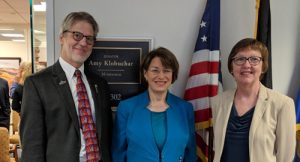WASHINGTON, D.C.—The ACR hosted the 2018 Advocacy Leadership Conference in Washington, D.C., on May 16–17. Rheumatology professionals from around the country flew to our nation’s capitol to attend the conference, where advocates heard from key policymakers and spoke with lawmakers about the issues that affect the rheumatology community—and what ACR/ARHP members can do to influence policy.
Day 1: Congressman Burgess Speaks
On Day 1 of the fly-in, after a morning of meetings of the ACR Government Affairs Committee, RheumPAC Committee, Committee on Rheumatologic Care, and Affiliate Society Council, advocates participated in an interactive education and training session focused on the asks they would be talking about in Capitol Hill meetings the next day. That evening, advocates heard from Rep. Michael Burgess (TX-26), an obstetrician who serves as chairman of the House Committee on Energy and Commerce’s Subcommittee on Health. Rep. Burgess discussed the importance of implementing policies that ensure access to high-quality, affordable care for all Americans, including the 54 million living with doctor-diagnosed rheumatic diseases.
As a Congressional champion of rheumatology, Rep. Burgess has a long history of supporting legislation to improve patient choice, increase access to medically necessary treatments, expand arthritis research funding and establish new programs for early diagnosis and prevention of rheumatic diseases. Before coming to Congress, Rep. Burgess served as a doctor for nearly 30 years and is the most senior physician in the House of Representatives.
“It was refreshing for us to hear from a physician-legislator with commonsense ideas who ‘gets it’ when it comes to issues of regulation and in physicians’ offices,” said Angus Worthing, MD, chair of the ACR’s Government Affairs Committee. “Dr. Burgess freely admits that repealing the Sustainable Growth Rate and passing a new Medicare reimbursement system [MACRA] in 2015 was just the beginning, and that he and his subcommittee want to know what needs to be done to make the law better.”

Outside her office, Sen. Amy Klobuchar (MN; center) greets Minnesota attendees Gary Bryant, MD, and Jody Hargrove, MD.
Day 2: Advocates Engage Lawmakers
On Day 2, advocates engaged with their leaders on Capitol Hill through more than 100 office visits. As constituents, they shared their stories and discussed the barriers to accessing and affording rheumatology care that many patients face. To ensure Americans living with rheumatic diseases can access the care they deserve, they asked lawmakers to reform fail-first step therapy policies that prolong patients’ pain unnecessarily and allow insurance companies to practice medicine without a license. Specifically, advocates called upon Congress to pass the Restoring the Patient’s Voice Act (H.R. 2077), which would help patients receive the most effective treatments faster by placing reasonable limits on the use of step therapy.
The rheumatology professionals also advocated for new legislation that would encourage more young doctors to enter the rheumatology profession; streamline the insurance prior authorization process; help control prescription drug costs by preventing pharmacy benefit managers (PBMs) from “gagging” pharmacists who want to tell patients when it’s cheaper to pay cash than to use their insurance; and establish a dedicated research program at the Department of Defense (DoD) for arthritis and rheumatic diseases. U.S. service members and veterans disproportionately suffer from arthritis, so it is critical that a portion of the existing, general funding for DoD-sponsored research be dedicated to studying rheumatic diseases.
David Daikh, MD, PhD, president of the ACR, told advocates and lawmakers that the field of rheumatology is at a critical juncture. “The rheumatology workforce is not growing fast enough to keep up with demand, and too many of our patients struggle to access and afford the breakthrough therapies they need to manage their pain and avoid long-term disability,” he said. “America’s rheumatology professionals are urging our lawmakers to act now and support bipartisan, common-sense legislation that would increase access to high-quality rheumatology care for their constituents.”
As the day ended, the ACR celebrated a few small victories and one large one: Not only did our initiatives for step therapy, rheumatology-specific research and others gain critical momentum, but the Department of Health and Human Services ordered PBMs to cease “gagging” pharmacists about patients’ purchasing options—exactly as the ACR and our coalition partners had advocated.
Want to Get Involved?
This year is an election year, and members of Congress welcomed the opportunity to learn more from their constituents about caring for patients with rheumatic diseases and how that care can be improved. As the rheumatology community’s policy priorities continue to gain momentum on Capitol Hill, it is important to keep engaging and educating lawmakers.
Even though the ACR fly-in has already taken place, it’s easy to participate virtually by visiting the ACR’s Legislative Action Center to advocate for these issues and send a pre-written, editable letter to your representatives informing them how they can support rheumatology professionals and patients living with rheumatic diseases.



